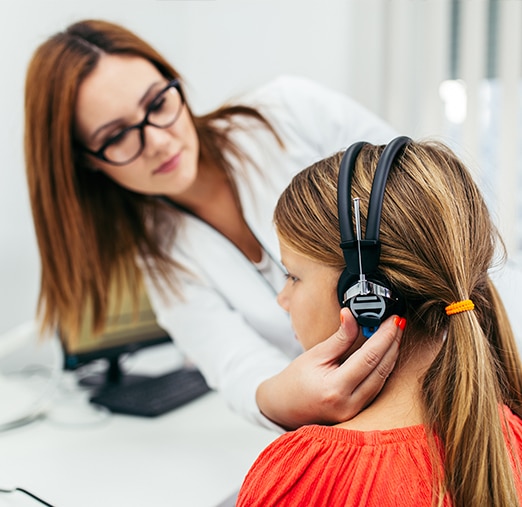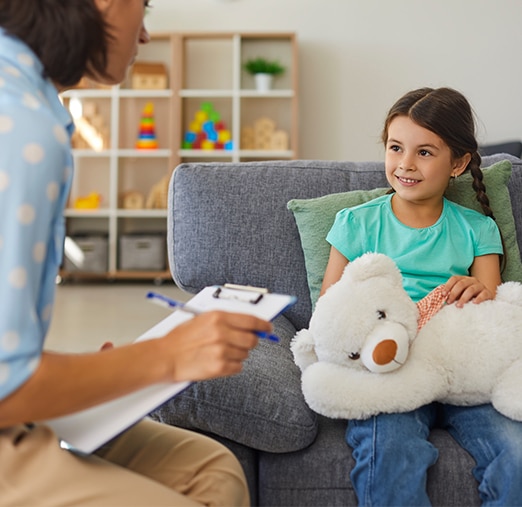
Pediatric Hearing Loss
- Genetics: About 1 out of 2 cases of hearing loss in babies is due to genetic causes. Some of these babies might have family members who also have a hearing loss.
- Medical issues at birth:
- 1 out of 4 cases of hearing loss in babies is due to maternal infections during pregnancy.
- Baby spent 5 days or more in a hospital neonatal intensive care unit (NICU) or had complications while in the NICU
- Needed a special procedure like a blood transfusion to treat severe jaundice
- Has head, face or ears shaped or formed in an atypical way
- Has a condition like a neurological disorder that may be associated with hearing loss
- Had an infection around the brain and spinal cord called meningitis
- Received a significant injury to the head that required a hospital stay
- Illness: Children who get ear infections may have fluid behind their eardrums that can cause temporary hearing loss. If ear infections are frequent and chronic, the child’s hearing fluctuates every time they have an infection, which can affect their language development and ability to process speech.
Pediatric Treatment Options
If your child is diagnosed with hearing loss, we will develop a comprehensive treatment plan. The type of hearing loss plays a significant role in a child’s treatment which is why early diagnosis is key to the treatment process. There are two types of hearing loss, conductive and sensorineural, and each has its own set of treatment options. Though the following solutions are common, they are only applicable to the type of hearing loss. Other factors such as the degree of hearing loss and lifestyle will also be considered. Deciding on the treatment plan can only be done after the child has undergone a hearing evaluation.
Hearing Aids for Children
Once a child has been diagnosed with a permanent hearing loss, they should be fit with hearing devices as soon as possible, even if they are infants, to maximize their speech and language development skills and academic success. The child’s home and academic environments are considered during the evaluation to ensure that appropriate technology is selected.
Hearing Evaluation Services (HES) realizes that in order for a hearing aid fitting to be successful for a child there needs to be a close, collaborative effort between the family, school, and audiologist. That is why we work closely with the family and the school to ensure that there is a continuum of care and that everyone is working together in the best interest of the child.
Verification
For a hearing aid fitting to be successful, the instrument must be set properly for your child’s hearing loss. HES uses verification equipment called VeriFit, which ensures that the hearing instruments are programmed appropriately with optimal volume and clarity of speech. The VeriFit system provides this information objectively, which is important when working with young children who are unable to provide feedback about how they’re hearing.
FM Systems
Frequently, children benefit most from hearing aids in conjunction with an FM system at home and/or at school. HES works closely with your child’s school district to ensure the selected hearing aid can be used with an FM system at school. In the classroom, the teacher speaks into a lapel-worn microphone and the sound is transmitted directly to the child’s hearing device(s), allowing the child to hear the teacher’s voice over the background noise.


Central Auditory Processing Disorder (CAPD)
Central Auditory Processing Disorder (CAPD), also known as an Auditory Processing Disorder (APD), is a series of problems that can occur during various listening tasks. Children with CAPD may hear normally, however, they are unable to comprehend or interpret the information they hear correctly. When a CAPD is present, the individual’s ear sends sounds to the brain, but the part of the brain responsible for translating those sounds does not function properly, resulting in a jumbled message.
If left untreated, children with CAPD may have speech and language delays. They also tend to have difficulty learning, especially in loud noisy classrooms. Early diagnosis is crucial because with the right treatment, a child with CAPD can do well in school and live a completely normal life.
CAPD Evaluations
CAPD evaluations are particularly useful for children ages seven and older who have normal hearing, but difficulty listening and learning in the classroom.
HES understands that a careful and accurate diagnosis is the first step to providing a comprehensive and effective treatment program. CAPD evaluations must be interpreted in the context of a complete psycho-educational test series, including measures of the child’s cognitive, language, and reading capacity. At HES, we scrutinize your child’s test for predictable sequences of errors or patterns in their responses that indicate the type of auditory delay they are experiencing. In doing so, we can determine the specific areas your child struggles with the most to develop a treatment plan that fits their individual needs.
CARD Treatment
CAPD treatment must be individualized, intense, and effective. Designing a plan to improve symptoms of CAPD requires the collaboration of multiple specialists, parents, and teachers. The child’s school and home environments are also taken into consideration. Modifications to your child’s classroom, homework, and in-school testing requirements may be recommended. In addition, an audiologist or speech-language pathologist can provide auditory training therapies to help your child develop better listening and organizational skills.

Educational Audiology
Hearing Evaluation Services of Buffalo has launched a new program in conjunction with the Educational Audiology Association to fulfill the mission of becoming a resource and advocate for providing hearing health services in educational settings.
The Educational Audiologist will focus on supporting students with hearing difficulties in an educational setting by evaluating the student’s hearing, listening, and auditory processing deficits that can affect their academic success, communication, and psychosocial well-being.
What an Educational Audiologists Offers
- Interprets audiological assessment results to school personnel and parents.
- Analyzes classroom acoustics and noise levels to make recommendations for equal access to auditory information presented in the listening environment.
- Makes recommendations regarding the use of hearing assistance technology (HAT): hearing aid(s), cochlear implant(s), group/ classroom amplification, and personal FM systems (assistive listening devices).
- Selects, fits, dispenses, & monitors HAT.
- Ensures the proper fit and functioning of HAT: hearing aids, cochlear implants, group/classroom amplification, and personal FM systems.
- Counsels and guides students, parents, and teachers regarding hearing loss and resulting needs.
- Provides the community with information to ensure that all infants, toddlers, and youth with impaired hearing are promptly identified, evaluated, and provided with appropriate intervention services.
- Establishes and coordinates appropriate referrals with outside agencies/practices for further audiological, communication, educational, and or psychosocial medical evaluations.
- Serves as a member of the educational team in the evaluation, planning, and placement process and makes recommendations regarding placement, related service needs, and modifications to classroom environments for students with hearing impairments or other auditory disorders.
- Provides in-service training on hearing, hearing impairment, auditory disorders, amplification devices, and their implication to school personnel, students, and parents.
- Provides educational programs for educational staff and the community.
If you are interested in learning more about our Educational Audiology Program, please call us.

